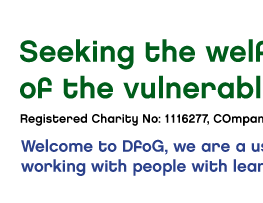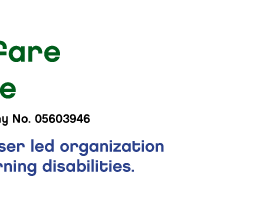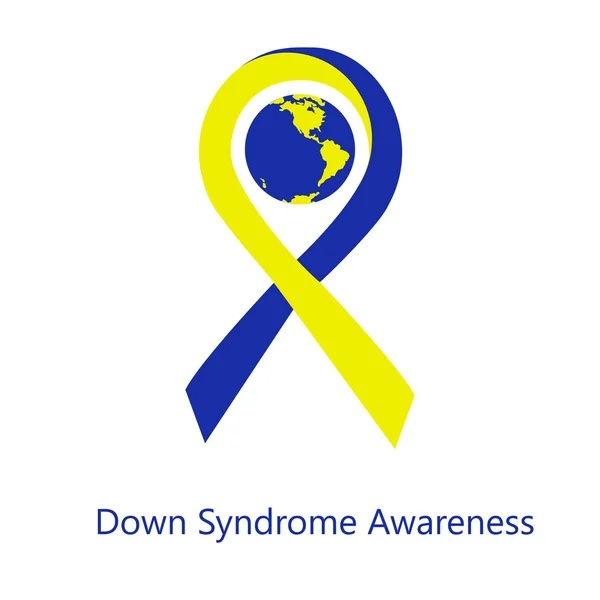| |
Our services are based on the belief that our service users are entitled to and should be empowered, encouraged and supported to enjoy the same lifestyle as any member of society. We achieve this by working in partnership with NGOs, health services, social welfare services, the Education Department and the government, along with the service users themselves, who are at the centre of our projects and actively participate in our shared vision.
Vocational Skills
Health & Well being
Improving physical and mental health: health action planning linked to person centred planning, promoting good physical and mental health, access to health services that everyone uses, specialist services that work in person centred ways.
Rights & Equality
We aim to influence, improve or change policy and law that affect the lives of people with learning disabilities and their families. We also aim to influence, improve or change policy and law that affect services that provide support, care and treatment.
 |
|
Ghana |
 |
|
Britain |
Legislations & Policies
DFoG has put in place within its service delivery policies that:
- Promote equality;
- Foster empowerment;
- Enable social inclusion;
- Promote independence and the elimination of social exclusion;
- Promote equal opportunities and rights;
- Fight oppression and discrimination;
- Campaign for social justice, human rights and the elimination of superstition around all learning disabilities.
Awareness
Our organisation is designed to undertake continuous research and development in all areas of learning disabilities, and to compile and document data and create awareness about these issues. The research and development unit works closely with local statutory bodies, NGOs, International Disability Organisations, the United Nations disabilities branch (Enable) and other representatives worldwide.
UN LOGO & PITURE FROM UN CONFERENCE
Health Research
People with learning disabilities in Ghana are being neglected in hospitals and all health care relating areas. A small proportion receives poor standards of health care while the majority does not receive any health care at all.
A DfoG research reveals the presence of a few psychiatrists providing services for about one fifth of the population who have learning disabilities that include Downs's syndrome. Autism, Epilepsy, Cerebral palsy and as a result, resources are stretched to the extent that it is only the fittest that survives in this case.
The research also highlights the substantial health care needs of people with learning disabilities. They have been marginalised and even lack access to the basic main stream health services. The new health insurance policies, shortage of human resources in health field have exacerbated the already worsened plight of people with learning disabilities in Ghana.
The research's identification of the huge gulf in assistance, if any, given to those with learning disabilities in this area, fills DfoG with great optimistic that its tireless campaign will help raise awareness and encourage health professionals and policy makers alike to pay some attention to this area of healthcare. It is also hoped that this will prompt the Ghanaian government to act sooner than later to end this misery for the learning disabled.
WHAT DO YOU KNOW ABOUT DOWN SYNDROME
From what is known about the causes of Down syndrome, environmental factors and parents' behavioural activity do not seem to play a role. Most cases (approximately 92 percent) are caused by trisomy 21, which means each cell in the body has three copies of chromosome 21 instead of the usual two copies. These Down syndrome causes, while genetic in nature, are not hereditary in the usual sense; the exception is translocation Down syndrome.
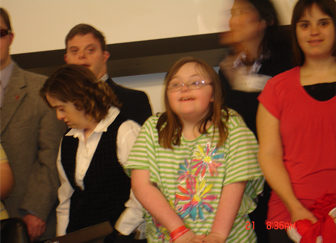 |
|
|
Most of the time, the occurrence of Down syndrome is due to a random event that occurred during formation of the reproductive cells, the ovum or sperm. As far as we know, Down syndrome is not attributable to any behavioural activity of the parents or environmental factors. The probability that another child with Down syndrome will be born in a subsequent pregnancy is about 1 percent, regardless of maternal age.
Generally the health of people with a learning disability has been improving over the years, as better health and social care has become available.
As a result, many people with a learning disability now have the same life expectancy as people without a learning disability.
However, as people with a learning disability get older, concerns about health are likely to increase. As well as the general problems associated with older age, people with Down's syndrome or profound and multiple learning disabilities may face more complicated health problems.
As representatives of Down syndrome International Ghana branch, our aim is to help people with Down's syndrome to live full and rewarding lives, by providing information & support for people with Down's syndrome, their families and carers and the professionals who work with them. We strive to improve knowledge of the condition. We champion the rights of people with Down's syndrome.
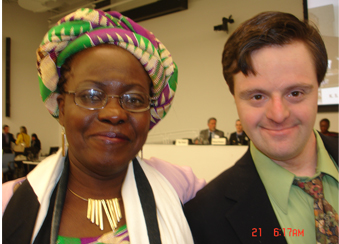 |
|
Picture with me and my American DS writer |
When someone develops dementia it can be confusing and upsetting for everyone involved. Some of the early signs of the disease may include communication problems and memory loss, and difficulty carrying out certain tasks.
However, there are many steps that can be taken to support someone living with the disease, allowing them to continue to enjoy life and to pursue many of the same activities for some time.
|
|

